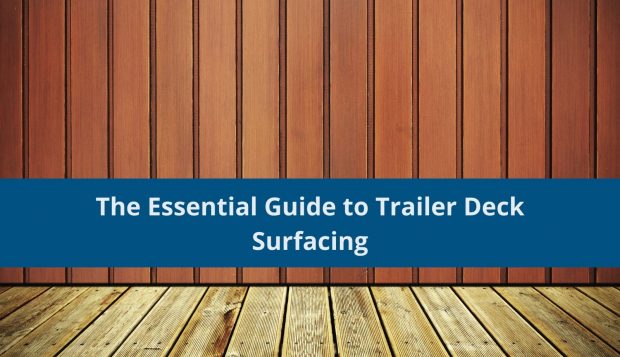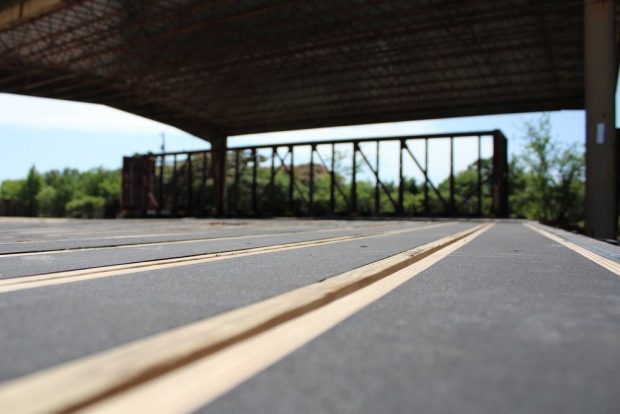The legal criterion for trailer flooring set down in the Code of Federal Regulations (CFR) is not a challenging one to meet. A Comprehensive Guide To Installing Decking On Commercial Trailers. To oversimplify the regulation in the CFR, the standard is given below, but to summarize it, a trailer floor must be well-built with no holes, tight enough to prevent gasses and flames from permeating it, provide some traction, and be kept relatively clean by the trailer owner. Although it may seem straightforward, there are numerous flooring alternatives available, making a decision in this area may be trickier than trailer builders had initially thought.

Different trailer flooring materials and installation methods have different uses and lifespans. Which flooring material to pick for a particular trailer build depends on the intended usage of the client, the pricing range, and durability considerations.
The flooring law is written as follows: 49 CFR 393.84 Floors – The flooring of all motor vehicles must be solidly built, devoid of obtrusive holes and openings, and kept in a condition that minimizes the entry of fumes, exhaust gasses, or fire. No oil or other substances that could harm people using the floor as a traction surface should be present on floors.
The following flooring solutions satisfy the prerequisites, although they serve distinct purposes and come in a range of prices. Southern yellow pine (treated and untreated), rough oak, and Douglas fir are the most often used decking materials in the open-top and livestock trailer industries. Knowing the distinctions is essential to selecting the right product for your trailer because each option has advantages and disadvantages.
Pine yellow in the south
It’s possible that Southern yellow pine (SYP) is the most popular type of wood for trailer decking. SYP is the most affordable decking product discussed in this article and is readily accessible in North America since it grows 35% quicker than it is cut. SYP is utilized for trailer decking primarily because to its strength and capacity for treatment absorption. Although pine is not a hardwood, it has a very robust fiber. SYP is more resistant to rot and decay than any of the other materials listed because its cell structure allows for higher chemical absorption. This advantage is not present in untreated SYP.
The drawbacks of SYP include its frequent flaws such knots, waning, and warping. In contrast to smooth surfaces and sharp corners, boards with knots and wane have rounded edges. SYP’s cell structure, which makes it able to absorb treatment so efficiently, also makes it susceptible to twisting and warping if it is not thoroughly dried after treatment.
For many years, trailer makers have purchased SYP in accordance with the grading requirements set forth by the Southern Pine Inspection Bureau (SPIB). According to this system, timber is graded from best to worst, with one being the best and four being the worst. Although purchasing options one or two would seem to result in higher-quality, more practical trailer decking, this isn’t always the case. The purpose of the SPIB grading specifications, which were created for the building and construction sector, is to rank lumber according to how well it will hold up when employed vertically. For horizontal use, such as trailer decking, other requirements apply.
The rough oak
Because of its resilience, rough oak is frequently used for trailer decking. The only decking material that is suggested for use with tracked machinery like skid steer loaders and excavators is oak.
The term “rough” oak is used in the trailer business to describe oak decking. Instead of using a planer to cut oak, as is the case with SYP, a band saw is often used. Compared to SYP or Douglas fir, rough oak is less regular in shape. In North America, the availability of oak is less common than that of SYP. The level of protection offered can be determined by the penetration, or how deeply preservative chemicals are injected into the wood.
The characteristics of the species and the therapeutic method dictate the depth of penetration. The less likely it is that the pressure-treated wood barrier will be breached, the deeper the penetration. Oak is dense and heavy due to the characteristics that make it robust, and its cell structure prevents optimal chemical absorption and retention.
Fistula Douglas
Douglas fir is preferred because it has several qualities that SYP lacks. In comparison to SYP, Douglas fir often has far less waning and fewer knots. Finding useable boards is now made simpler by this. Since Douglas fir has a more stable fiber than SYP, there is less warping.
Douglas fir, on the other hand, does not readily absorb treatment without an expensive procedure called insizing in which the wood is made ready for preservative treatments. As a result, it is more susceptible to rot and decomposition. The procurement of Douglas fir is another problem because it grows considerably more slowly than SYP and longer length boards are more challenging to find. Due to these features, Douglas fir is a more expensive option for decking.
Decking made of steel
One of the most durable common alloys is steel. Steel decking has long been a well-liked option in the trailer construction industry due to characteristics like dependability and durability. Because steel has a higher modulus of elasticity than aluminum, more force must be exerted to bend steel before it does, making steel stronger than aluminum.
The major drawback of steel decking is that it can rust, necessitating frequent inspection in order to make repairs that would stop additional rusting. Paint scratches must be repaired as soon as possible to prevent oxidation. If the steel has been galvanized, rust inspections are not necessary as frequently.
The galvanic coating must be removed prior to welding when making repairs to galvanized steel decking. The structural integrity of the trailer will be weakened by rust, which has a terrible aesthetic appearance as well. Since steel trailers need to be repainted after repairs in order to avoid rust, the labor expenses involved in repairing steel trailers are frequently higher than those connected with repairing identical trailers made of aluminum. Steel decking, which can become exceedingly slick in wet weather and reduce cargo capacity owing to weight, can also become quite slippery.

Leave a Reply